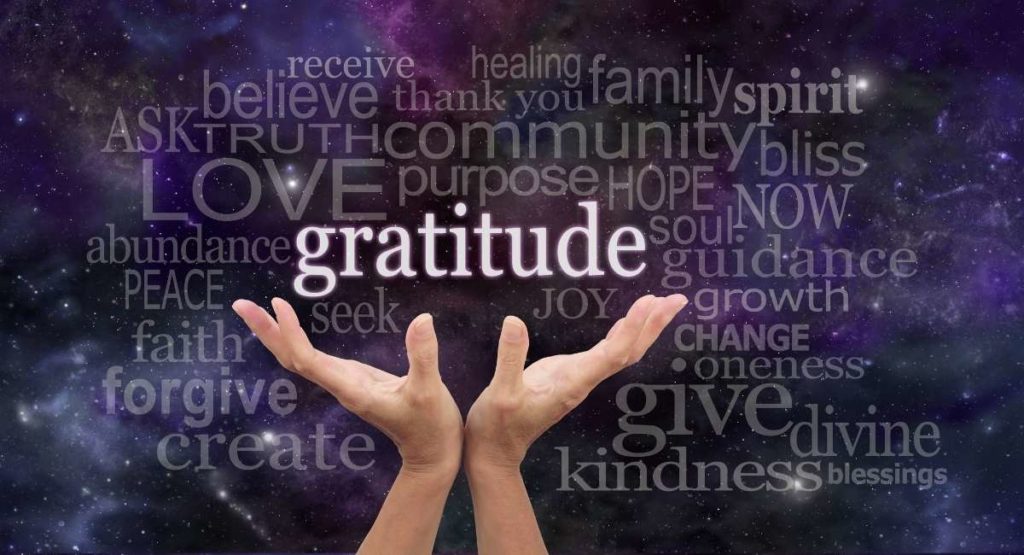


The world is a glorious and incredible place.
Our lives can distract us from this crucial fact, but every so often, we find ourselves staring at a sunset a second longer, or being in awe of a stunning mountain top.
These moments, along with the ones we share with our loved ones, fill us with gratitude.
But, what does gratitude mean, exactly, and why is gratitude important?

It’s the feeling of being thankful and the willingness to show appreciation for certain qualities, people, situations, or moments.
Gratitude is a powerful emotion with powerful implications, ones we don’t even fully understand yet.
What we do know is that gratitude helps improve our overall well-being, and the psychology of appreciation has some other crucial benefits as well.
Let’s examine this awesome emotion with keen eyes and highlight the power of gratitude in building a happy and healthy home.
Some of the most crucial benefits of gratitude include:
- Boost in happiness
- Change in social skills
- Cascading effect on personality
- Improvement in health
- Improves your career

Benefits of Gratitude
The science of gratitude shows that there are many mental and physical health benefits from practicing.
Here are some of the ways gratitude improves your well-being.
1. Boost in Happiness
The popular expression, “money can’t buy happiness,” maybe a controversial take for most people, but we now know that gratitude can “buy” happiness.
A recent study found that the simple act of expressing gratitude using a journal for five minutes each day has a profound impact on our happiness levels in the long-run.
How profound, you ask?
Studies have shown that gratitude journal benefits can boost your happiness levels by 10 percent and more, which has the same impact as when you double your income.
This video explains its benefits further.
2. Change in Social Skills
Social capital is defined as the network of relationships among people who live and work in any given society.
It’s a valuable, almost priceless currency in today’s world, and gratitude can help you gain more of it with relative ease.
Another study that examined the change in social dynamics created by gratefulness proved that those who regularly experience this sentiment tend to have more friends, deeper relationships, and a sturdier marriage.
3. Cascading Effect on Personality
There’s a reason why gratitude is considered one of the most powerful emotions in the world—it’s because it can have a cascading effect on an individual’s overall personality.
Several studies have shown that grateful people tend to be more optimistic, less materialistic, and have greater self-esteem.
Each of these corresponding traits leads to the same winding road: greater levels of happiness.
4. Improvement in Health
Your physical health improves by leaps and bounds when you begin to practice being grateful regularly.
In one study, participants who were asked to maintain a journal for gratitude reported:
- Better sleep quality
- Improved subjective well-being
- Improved sleep
- Feeling more refreshed after waking up
- Lower pain interference
- Higher functional status‘
It’s safe to say that grateful people sleep better and are happier in day-to-day life!
Does Gratitude Help You Live Longer?
There have been several studies to highlight the positive effect of gratitude on physical health.
We now know that this emotion can improve our health and, therefore, help us live a longer and healthier life.
5. Improves Your Career
Gratitude in the workplace can be a powerful force.
A recent set of studies managed to highlight the many surprising benefits of this emotion, and the results are as follows.
Gratitude:
- Offers a greater sense of being able to achieve career goals
- Improves employee well-being and leads to fewer sick days
- Increases job satisfaction
- Higher satisfaction with co-workers
It was also seen that when managers are more grateful to their employees, it increases their overall productivity.
If you have a grumpy boss at work, perhaps showing them this stat will help turn their attitude around.
Well, you can hope, at least!
Discover the Three Keys of Gratitude in this video.
How to Practice Gratitude
Practicing being grateful comes extremely naturally to some and can be annoyingly difficult for others.
It all comes down to how each person is wired, and as we all know, everyone is wired differently!
If you find it a struggle to integrate gratitude and happiness in your life, please don’t fret.
There are some simple things you can do to practice being grateful and take on the benefits of this powerful emotion:
- Use a gratitude journal
- Talk to your loved ones about your feelings
- Be mindful
Holding in our feelings is archaic thinking; let’s teach our young boys and girls that it is natural to talk about our feelings!
Gratitude Journal
Keeping a gratitude journal is known to be an effective and simple method of expressing gratitude in a personal, meaningful, and lasting way.
Just take five minutes each day to jot down the things that you are truly thankful for.
Here are some of the many things you could be grateful for:
- People
- Career
- Passions
- Childhood memories
Writing these down will help cement them in your brain circuitry, and they’ll be available for easier recall when you need a pick-me-up or just a gentle reminder that life is pretty sweet!
What Is the Best Gratitude Journal App?
The Day One Journal is an award-winning gratitude journal that lets you track your grateful memories with incredible ease.
There are numerous options in the market available today, though, so it might be worth considering other options based on your preference, including 365 Gratitude and Mojo Gratitude Journal.
Do Gratitude Journals Really Work?
Four new studies have proven the effectiveness of gratitude journals in improving mental health, increasing life satisfaction levels, reduces chances of burnout, and even perceived prosocial impact and work engagement.
So the short answer would be, yes, gratitude journals really do work!
Tell The Ones You Love How You Feel

Most of us have special people in our lives who have no idea how much they mean to us and how deeply they’ve affected us in the most wonderful ways.
The simple act of expressing these emotions to your loved ones won’t only make you feel good, but it’s sure to brighten up their day as well.
Do not assume that your loved ones already know exactly how you feel!
Always Be Mindful
Being mindful is an alien concept to the vast majority, but it’s one of the most important ways of enjoying your life and boosting your gratitude levels.
What exactly does being mindful mean?
Being in the present moment by engaging all your senses and allowing your conscious mind to stay with you is being mindful.
Try to do this instead of wandering away to distant memories or plans—be in the moment.
Doing this makes you more conscious of every action, word, movement, and sense, and allows you to see the beauty and purpose of life.
It’s a simple yet powerful exercise to practice and is known to have long-term benefits on your health and well-being.
One of these benefits is the reduction of blood pressure by changing the gene expression of 172 genes that regulate glucose metabolism, inflammation, and circadian rhythms.
Some of the other benefits include:
- Reduced anxiety and depression
- Prevent irritable bowel syndrome
- Improved PTSD symptoms
- Prevent fibromyalgia
- Prevent psoriasis
Gratitude practice may be difficult at first, but hopefully, these benefits will encourage you to stick to it.
Gratitude and Children

Children should also be taught the importance of gratitude in life. They, too, will feel the benefits of showing appreciation.
At What Age Should a Child Say Please and Thank You?
Children start speaking their first words between the period of 10 to 15 months.
This is a great time to introduce some healthy and grateful words to their vocabulary, such as please and thank you.
You can expect them to start using these words between 18 to 24 months.
How Do I Teach My 5 Year Old Gratitude?
There are numerous ways to teach gratitude to a five-year-old and kids in general.
Including Gratitude in Daily Conversations
The way we speak around young children helps paint a picture of the world around them.
An aggressive tone implies a hostile world, but a soothing tone that includes phrases such as, “We’re so lucky to be together!” and “We’re so lucky to share this delicious meal,” can help children think differently.
Such phrases make them look inward and outward simultaneously, helping them connect the joy they feel around their family to the sheer presence of being a part of this world.
Creating Routines Around Being Thankful
You may think that this is an age-old idea, and you’d be right to think this.
It’s been around forever because it’s worked forever!
It simply involves picking a particular time each day to say thank you for all the things that day.
This obviously works best at the end of the day, specifically before dinner or before bedtime.
Doing this will help your child relive the happy moments of the day and end their evening on a grateful note.
With enough repetition, being grateful at the end of each day will simply become second nature to them.
Encourage Generous Behavior
Children are inherently awesome, and they’ll display good behavior with impressive regularity.
It’s vital to encourage this behavior and make them seek it out whenever they can.
This can involve making them go with you to donate toys and clothes to those who are less fortunate and then creating a dialogue about the importance of giving to those in need.
It may seem harsh to expose children to the misery of the world at an early age, but they’re far more sensitive to such matters than we give them credit for.
They’ll likely want to help those in need in most cases instead of shying away from problems.
How Do You Explain Gratitude to a Child?
You can explain gratitude to a child by highlighting this emotion every time you see them experience it first hand.
This will help them understand what it means to be grateful because they’ll be experiencing it at that very moment.
Most children are grateful for all the littlest things we do for them, especially at a young age, and they might not even realize it.
Just hand them a cone of ice-cream as a surprise and watch their faces light up in gratitude.
Gratitude for kids comes as naturally as a smile.
FAQs About Gratitudes

How Does Gratitude Benefit the Brain?
Gratitude benefits the brain in multiple ways, one of which includes affecting the nature of your brain.
This powerful emotion has been known to cause some substantial changes in the human brain.
Those who are known to feel or express this feeling keep their gray matter functioning and actually increase the gray matter volume in the right inferior temporal gyrus.
Whenever we express or receive this sentiment, the brain also releases dopamine and serotonin—chemicals that help us feel good about ourselves.
How Do You Show Gratitude in Words?
You can show gratitude by being honest and expressive.
There are no right or wrong words to show gratitude as it’s an emotion.
You just need to speak from your heart, which will allow the other person to understand how you feel.
Why Is Gratitude so Powerful?
Gratitude is powerful because it essentially rewires our brain.
Feeling grateful leads to a series of powerful neurochemical changes that include the release of the feel-good chemicals—dopamine and serotonin.
These chemicals tend to change our mood drastically and alter our thoughts and actions almost instantaneously.
When we start feeling good about ourselves and our current situation, it can lead to a cascading effect of positive benefits.
This includes some of the incredible physical and mental transformations that we’ve mentioned above.
There are many incredible health benefits of gratitude, and they all start with the changes in the brain.
Tools to Help With Practicing Gratitude
A Shift In Perspective
Is it really that simple to have a happy, healthy, peaceful, and loving home?
The results are in, and science has answered with a resounding YES!
All it takes is five minutes each day to simply think about those people or memories that fill our hearts with joy and make us grateful for being alive.
Some of us may not have much to be grateful for, but those who do should never take it for granted!
Embracing the good in life leads to a cascading effect of positivity.
All it takes is just a gentle shift in our perspective and life will never be the same again.




